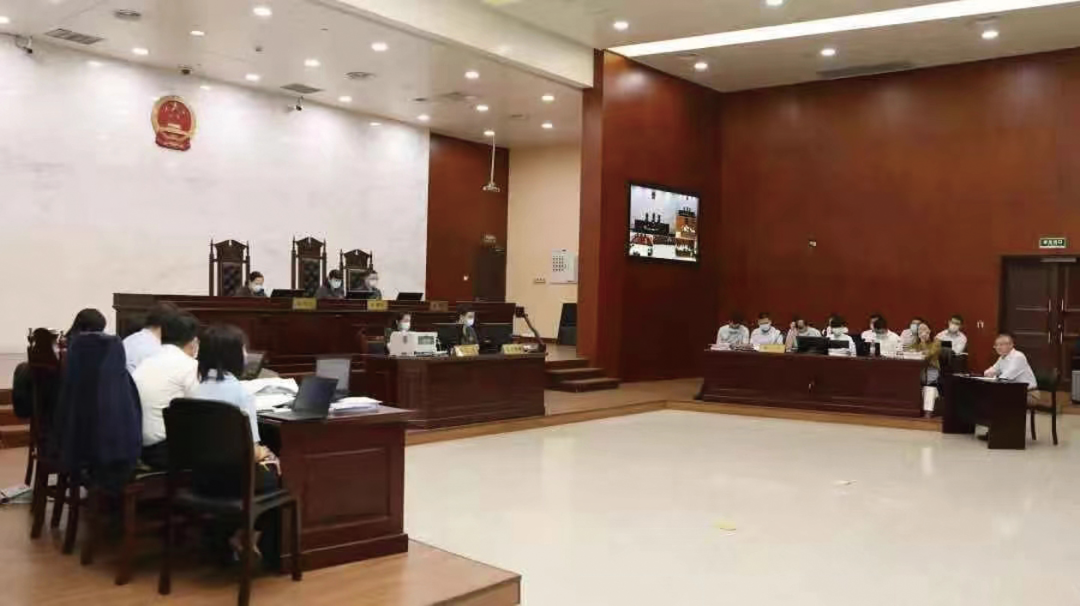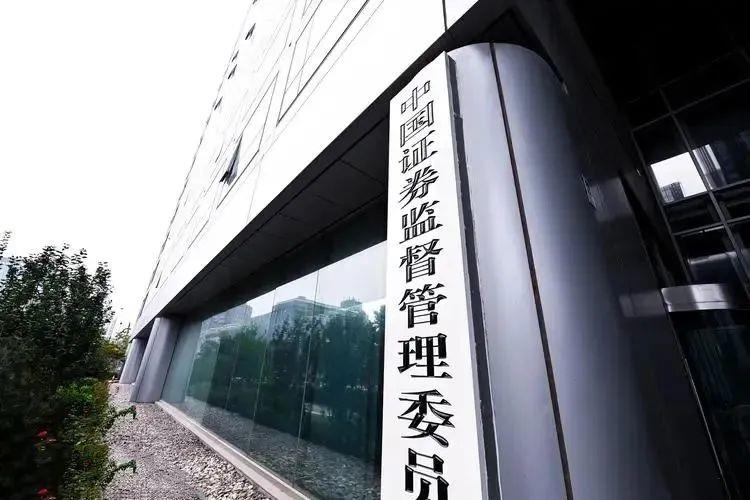Lawyer Gao Peng Accepts an Interview with Legal Literature Collection to Interpret the Risk Prevention of Lawyers in Securities Firms
The Shanghai Financial Court concluded the country's first case of civil compensation for fraudulent issuance of asset-backed securities (ABS) and the "Wuyang Bond Case", which had a great impact on the industry. Recently, the Legal Literacy Daily hosted by the Legal Daily interviewed relevant legal practitioners on such hot issues as the duty of care, the scope of responsibility, and risk prevention for law firms in the above-mentioned cases. Lawyer Jiang Liyong, Senior Partner of Gaopeng Law Firm, was also invited to an interview and expressed relevant opinions. Gaopeng official account has extracted and forwarded the essence of the article for readers.

The scene of the trial of "Wuyang Bond Fraud Issue Case" (photo source: official account of Hangzhou Intermediate People's Court)
Recently, the Shanghai Financial Court concluded the country's first case of civil compensation for fraudulent issuance of asset-backed securities (ABS). Kunshan Meggitt Dengdu Management Co., Ltd. (hereinafter referred to as "Dengdu Company"), the original owner, was sentenced to compensate the plaintiff Postal Savings Bank of China Co., Ltd. for its loss of interest on investment capital of more than 560 million yuan.
In addition, the four intermediary agencies bear joint and several liability for compensation within their respective scope of responsibility. Among them, Huatai United Securities Co., Ltd. (hereinafter referred to as "Huatai Securities") was awarded 100% joint and several liability as a financial advisor, Shanghai Fucheng Haifutong Asset Management Co., Ltd. (hereinafter referred to as "Haifutong Asset Management Company") was awarded 30% compensation liability as a manager, and Beijing Jindu Law Firm (hereinafter referred to as "Jindu Law Firm") was awarded as a legal advisor As a rating agency, China Credit Rating Data Technology Co., Ltd. (hereinafter referred to as "China Credit Rating Company") bears a 10% compensation liability.
The case has attracted significant attention in the financial and legal circles. It is worth noting that this is also the second case in which Jintiancheng Law Firm was sentenced to bear joint and several liability of nearly 37 million yuan for Securities fraud issuance, following the "Wuyang Debt Case" in 2020.
Several securities industry practitioners interviewed by reporters stated that these two cases have indeed caused a significant impact in the legal industry, especially on lawyers engaged in securities business.
Jiang Liyong, Senior Partner of Gaopeng Law Firm, believes that: "The successive occurrence of the two cases also reveals that the risks and benefits of the current industry are not proportional to each other, which may have some impact on the industry. It is not ruled out that some Risk aversion law firms and lawyers will increase the level of fees, or reduce the contracting and undertaking of such businesses. In addition, it may also promote the improvement of the quality of intermediary institutions' due diligence. However, the practice of Relevant market does have historical reasons, and the problem will not be solved overnight And that's it
Original Cause of the First ABS Fraud Case Litigation
Asset backed securities (ABS), also known as securities backed by asset credit, first appeared in Western financial markets. In 2005, China issued the first batch of asset-backed securities in the interbank market. According to the Report on the Development of Securitization in 2022 recently released by the China Bond Research and Development Center, in 2022, China's Securitization market will issue 1.97 trillion yuan of various Securitization products, and the year-end stock size will be close to 5.24 trillion yuan. At present, asset backed securities have become a relatively mature securities issuance model in China.
The ABS fraud compensation case heard by the Shanghai Financial Court can be traced back to 2016. On July 26, 2016, Postal Savings Bank of China Co., Ltd. (hereinafter referred to as "Postal Bank") signed a Subscription Agreement with Haifutong Asset Management Co., Ltd., the administrator, to subscribe preferred securities worth a total of 967 million yuan under the Huatai Meggitt Light Capital Asset Support Special Plan.

The basic asset of the special plan is the rental debt enjoyed by Dengdu Company to the lessee under 110 lease contracts signed with 108 merchants for the first phase of the Meggitt Industrial Products Expo City project during a specific period (January 1, 2017 to December 31, 2019).
Jindu Law Firm, Zhongxin Corporation and Huatai Securities are legal advisers, rating agencies and financial advisers respectively. On September 29, 2016, the special plan was officially launched and established. In November 2016, the securities were listed on the Shanghai Stock Exchange.
Afterwards, due to the failure to recover the rent receivable for the basic assets of the special plan as scheduled, and the insufficient funds available for distribution in the special plan account to pay the principal and interest, Haifutong Asset Management Company, as the special plan manager, sued the debtor and guarantor of the difference payment of the special plan to the court and obtained successful judgments respectively. But in the subsequent execution process, the court ruled to terminate this execution.
The case also sparked scrutiny by regulatory authorities. After review, the Jiangsu Securities Regulatory Bureau has issued regulatory measures to order correction and issue warning letters to the original equity holder Dengdu Company and four intermediary institutions respectively. The Shanghai Stock Exchange made a disciplinary decision to publicly condemn the original owner Dengdu Company.
In July 2020, Postal Bank filed a lawsuit to the Shanghai Financial Court, requiring the five defendants to jointly bear joint and several liability for the plaintiff's losses.
In April 2023, the Shanghai Financial Court made a first instance judgment. The court held that the underlying assets and their cash flows involved in the case were seriously false, Dengdu Company should compensate the plaintiff for the loss of principal and interest due to the fraudulent issuance of asset-backed securities, and Huatai Securities should bear joint and several liability for compensation for deliberately concealing the fact of the fraudulent issuance of the issuer. The other three intermediaries are respectively liable for joint and several compensation for their gross negligence in the formation and issuance of False statement in the information disclosure documents.
Incredible False statement
During the trial, the court conducted a trial around the due diligence of four intermediary agencies, and the focus of the trial was whether the underlying assets of the special plan involved were false.
The reporter noticed in the judgment of the first trial that many False statement in the process of issuing asset-backed securities were incredible. The court found that according to the statements made by Dengdu Company and Kunshan Meijite Real Estate Co., Ltd. (the property project holder, hereinafter referred to as "the real estate company") in Jiangsu Securities Regulatory Bureau, Dengdu Company is a "Shell corporation" that has no income, no employees and is highly confused with the real estate company. The main business and cost of Dengdu Company in the three years before the establishment of the special plan involved in the case are zero.
In addition, based on the review by the Shanghai Stock Exchange, the court found that Dengdu Company had multiple violations. For example, the special plan manual discloses that the lease contract corresponding to the basic assets of the special plan stipulates a rent-free period of one year from the date of contract signing, but the actual rent-free period implemented is three years; In addition, from the second half of 2015 to the second half of 2016, Dengdu Company deposited funds into various store accounts on a monthly basis, and the stores returned the same amount of funds as rent to Dengdu Company, artificially creating a flow of funds.
In addition, in early 2018, Dengdu Company cleared 88 merchants involved in the basic assets, resulting in a large number of unqualified basic assets in the special plan. However, Dengdu Company did not fulfill its obligation to redeem unqualified basic assets in accordance with the relevant contract agreements and the commitments made in the issuance documents.
Based on the above facts, the focus of the court's trial on Jin Du Law Firm is whether it is diligent and responsible, has faults and should bear compensation liability in the process of issuing the Legal opinion.
According to the statement of Jindu Law Firm, it reviewed 110 "Lease Contracts" and "Rent Confirmation Letters" during due diligence, conducted interviews with tenants (but did not indicate their legal identity), and conducted on-site inspections on the project site. For each tenant who records merchant information on the platform, they have searched online for business information and confirmed that the contract signatory information matches the business registration information.
However, according to the statement made by the lawyer of Jindu Law Firm in Jiangsu Securities Regulatory Bureau, the execution of relevant contract agreements such as the Rent Confirmation was a written review, and there was no interview with the tenant, which was mainly done by Huatai Securities. Except for the discussion of the transaction structure and kickoff meeting, the Jindu Law Firm did not have direct contact with the original equity holders and did not arrange interviews with the original equity holders and tenants. In addition, Jindu Law Firm sent the adjusted template of the 'Rent Confirmation Form' to Dengdu Company for them to fill in the relevant content and the lessee to sign. Jindu Law Firm did not verify the authenticity of the content filled in.
In this regard, the Shanghai Financial Court held that Jindu Law Firm failed to fully examine the identity documents of 108 lessees and omitted the identity documents of nearly half of the lessees. Jindu Law Firm also did not provide conclusive evidence to prove that on-site investigations, interviews, and other methods were used to confirm that the lease contract was the true expression of the lessee's intention. King Du Law Firm seriously violated the duty of care, and had gross negligence in the formation and release of False statement in the information disclosure documents.
Based on the job responsibilities of Jindulu in the issuance process of asset-backed securities, its role in the formation and release of information disclosure documents, and the actual measures taken to verify relevant information, the court has determined that Jindulu's liability for compensation to Dengdu Company shall be joint and several within 10%.
Why is counterfeiting difficult to detect
Why did the law firm not detect these seemingly obvious false situations during the due diligence process?
Lawyer Jiang Liyong believes that compared with stock issuance, in the past, the industry generally believed that bond issuance business, including Securitization business, had lower duty of care in due diligence, less risk in practice, and more intense competition, so the level of legal service charges was generally low, which is indeed an indisputable fact.
A legal advisor to a securities company that has been engaged in IPO for a long time told reporters that this situation is also related to the good bond market environment and the widespread sense of luck in the past. We are in the stock issuance business and have strict due diligence requirements, but bond issuance has always been considered an area where there is not much risk. As the 'gatekeepers' of the securities market, intermediaries should certainly be truthful, accurate, complete, and diligent, but many times they have not done so. There is a common mentality of taking chances, believing that the economic environment is good, and bonds will basically not have problems
Lawyer Jiang Liyong suggests that law firms should start from the source and start from the screening of projects to prevent risks in securities business. In the face of fierce market competition, how to prevent Gresham's law may be a problem that needs in-depth consideration not only by law firms, but also by regulators and other market entities.
Ring the alarm for the lawyer industry
In recent years, the regulatory responsibility of the capital market has been tightened towards intermediaries. Two successive cases of Securities fraud in which the issuing law firm was sentenced to undertake joint and several liability of tens of millions will undoubtedly make the securities issuing intermediary more cautious, and at the same time, it has also sounded the alarm bell for the lawyer industry engaged in securities issuance.
On December 31, 2020, the "Wuyang Bond Case" decided by the Intermediate people's court of Hangzhou City, Zhejiang Province in the first instance was the first case of fraudulent issuance of corporate bonds in the history of securities in China, and was considered to be the first case in China in which intermediaries such as underwriters, law firms and accounting firms were judged to be jointly and severally liable for investors' debts.
Finally, the court ruled that Chen Zhizhang, chairman of Penta-Ocean, Debang Securities and Daxin Certified Public Accountants should bear joint and several liability for 487 natural person investors' debt principal and interest totaling 740 million yuan, while Jintiancheng Law Firm and Dagong Global Credit Rating Credit Rating Co., Ltd. should bear joint and several liability for the above debt within 5% and 10% respectively.
In this case, Jintiancheng Law Firm was entrusted by Penta-Ocean Company to witness the issuance process, placement behavior, qualification conditions of investors participating in the subscription, capital allocation and other matters, and issue a special Legal opinion.
Regarding the responsibility determination of Jintiancheng Law Firm in this case, the court believes that in the process of providing legal services for bond issuance, the responsibility of the law firm cannot be solely a formal review, but should pay necessary attention to major issues that affect the issuer's bond issuance conditions and solvency. In the case that Dagong Appraisal Company's 2015 Corporate Bond Credit Rating Report has indicated the sale of investment property by Penta-Ocean's holding subsidiary, Jintiancheng Law Firm failed to pay necessary attention to and verify the issuer's disposal of the aforesaid major assets, and failed to discover the legal risks brought by the relevant asset disposal to the debt paying ability, and there was a fault.
According to the trial ideas of the two cases mentioned above, it can be seen that the law firm cannot use the performance of surface examination work as a reason for self defense without responsibility, and should also prove that it has fulfilled its substantive examination obligation. How to determine the responsibility of the law in securities issuance?
In January 2015, on the basis of the "Pilot Measures for Corporate Bond Issuance", the China Securities Regulatory Commission issued the "Management Measures for Corporate Bond Issuance and Trading", which stipulated that intermediary institutions and personnel providing services for corporate bond issuance should be diligent and responsible, strictly abide by professional norms and regulatory rules, and fulfill their obligations in accordance with regulations and agreements.
In addition, the Supreme People's Court issued Several Specific Issues on Current Commercial Trial Work in December 2015 and Several Provisions of the Supreme People's Court on Hearing Civil Compensation Cases for False statement Infringement in the Securities Market in January 2022, which further attributed the determination of civil compensation liability for securities False statement infringement.
It is understood that the parties involved in the aforementioned ABS fraud compensation case have already filed an appeal.
We should further strengthen the professional liability insurance of the lawyer industry, especially for securities firms and lawyers, we can consider supplementing insurance. From the perspective of the law firm, we can consider restructuring it into a special general partnership to avoid putting the entire securities business team or the entire law firm at risk due to a single case. "Lawyer Jiang Liyong said.
Related recommendations
- Gaopeng Law Firm held a special seminar on "New Trends in Securities Crimes and Practical Defense Experience"
- Lawyer Xie Xiangyang and Lawyer Li Min from the Shanghai office have been awarded the titles of "Gold Medal Evaluation Expert" and "Gold Medal Mediator" by the Shanghai Financial Consumer Dispute Mediation Center
- The 149th issue of the book club, "Practical Operations of Capital Reduction in Private and State owned Enterprises," was successfully held
- Gaopeng Law Firm's 2024 Partner Year End Meeting Successfully Held



